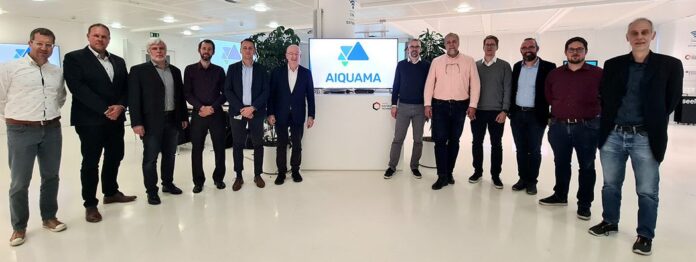Anomálie a vady ve výrobním procesu s sebou nesou vysoké náklady a negativně ovlivňují udržitelnost a produktivitu. Pokud lze takové vady odhalit ihned, jakmile se objeví, můžeme se vyhnout nákladným předělávkám, časově náročným výstupním kontrolám i zpoždění dodávek. A právě na řízení kvality výrobních procesů s využitím umělé inteligence se zaměřuje německo-český výzkumný projekt AIQUAMA (AI-based Quality Management for Smart Factories), který byl slavnostně zahájen 7. listopadu na Fóru digitálních technologií v Berlíně.
Zajištění kvality přímo ve výrobním procesu se ukazuje jako stále důležitější. Cílem česko-německého projektu je dosáhnout toho, aby na konci výrobního procesu byly vysoce kvalitní výrobky bez chyb a bez zmetků. Zejména při méně automatizovaných úkonech, jako je třeba montáž, umožní jednoduchá robotická řešení s technologií umělé inteligence monitorovat jednotlivé úkony a v případě odchylek a nepřesností o tom pracovníky informovat. Výrobce navíc bude moci nasadit takové řešení do provozu i bez hlubších znalostí robotiky či datové vědy.
Projekt AIQUAMA představuje německo-českou výzkumnou spolupráci v oblasti Průmyslu 4.0 stojící na společných základech, jako RICAIP, jehož cílem je vybudování mezinárodního výzkumného centra pro pokročilou průmyslovou výrobu. RICAIP se zaměřuje na výzkum v oblasti umělé inteligence a robotiky pro pokročilý průmysl a vyvíjí nové výrobní koncepce pro geograficky distribuovanou výrobu. Vznik centra je financován z evropských a národních fondů a propojuje experimentální laboratoře, tzv. průmyslové testbedy v CIIRC ČVUT a CEITEC VUT s německým testbedem v Saarbrückenu, který spravují instituty DFKI a ZeMA.
Profesor Vladimír Mařík, vědecký ředitel CIIRC ČVUT, upřesňuje: „Projekt AIQUAMA je bezprostředním a konkrétním rozšířením projektu RICAIP. Témata nejen sledují, ale současně formulují klíčové výzkumné trendy v oblasti Průmyslu 4.0 v příštím desetiletí a posouvají vize Průmyslu 4.0 k novým cílům. Důležité je, že jsou to trendy, které náš klíčový průmysl vítá a podporuje.„
AIQUAMA chce dosáhnout bezvadné výroby tím, že v jejím průběhu bude kvalita postupně monitorována v reálném čase. K tomu poslouží vyhodnocování datových toků z více senzorů pomocí metod umělé inteligence. AIQUAMA bude používat kombinaci symbolických modelů a statistického strojového učení založeného na skutečných, ale i uměle generovaných syntetických tréninkových datech.
Aby se předem předešlo chybám souvisejícím s kvalitou, bude inteligentní online plánovací komponenta rozšířena tak, aby již při sestavování plánu a zadávání úkolů byly co nejlépe zohledněny i parametry související s kvalitou. Chyby mají tendenci vznikat především při ruční montáži, obrábění nebo při úkonech prováděných v hybridních týmech lidí a kolaborativních robotů. Jednou z takových chyb je například to, že pracovník sáhne do nesprávné krabice s materiálem, použije nesprávný nástroj při ruční montáži nebo se robot zapojí do práce v nesprávnou dobu.
Vhodné propojení různých senzorických systémů v průběhu výrobního procesu umožní co nejvčasnější odhalení těchto chyb a jejich co nejúčinnější eliminaci. Zjištěné chyby budou jasně objasněny prostřednictvím vhodných uživatelských rozhraní, aby se jim bylo možné v budoucnu vyhnout.
Pokud jde o technickou stránku projektu, partneři využívají standardizovanou architekturu Průmyslu 4.0 s digitálními AAS (Asset Administration Shells) vyvinutými v rámci série projektů BaSys, zejména Open -Source Middleware BaSyx a také open-source výsledky z jejich ekosystému.
AIQUAMA má přiděleny prostředky od spolkového ministerstva školství ve výši cca 1,8 milionu EUR na 3 roky (leden 2022 až červen 2025).
Partnery projektu AIQUAMA jsou
- DFKI – Německé výzkumné centrum pro umělou inteligenci
- CIIRC ČVUT – Český institut informatiky, robotiky a kybernetiky ČVUT v Praze,
- CEITEC VUT – Středoevropský technologický institut, VUT v Brně
- VŠB – Technická univerzita Ostrava
společně s aplikačním partnerem Volkswagen AG (který nezískává finanční prostředky).
Publikováno na německém informačním portálu pro vědu idw-online.de (v němčině) a idw-online.de (v angličtině) a na webu RICAIP ZDE




